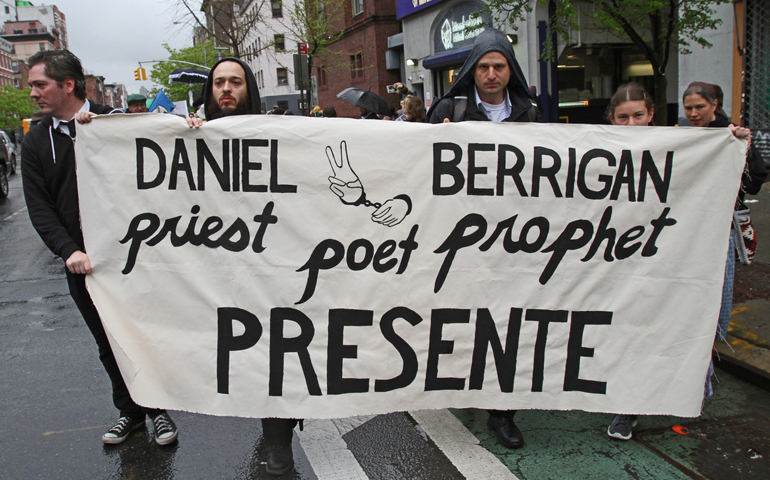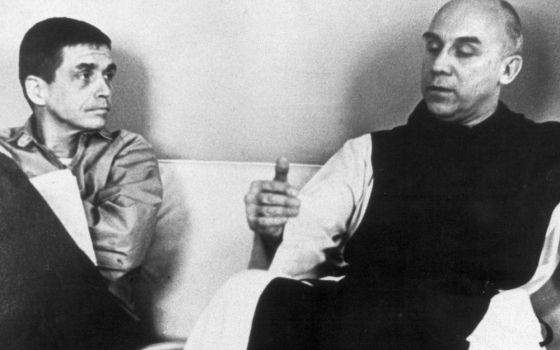
Mourners march May 6 prior to the funeral Mass of Jesuit Fr. Daniel Berrigan. (CNS/Gregory A. Shemitz)
Jesuit Fr. Daniel Berrigan was regularly challenged during his life by skeptics and newcomers to the cause of peacemaking to show the results of the thankless work he had undertaken. He regularly responded that God calls us to faithfulness, not success.
The outpouring of stories since his death at age 94 on April 30 -- stories about the countless lives he deeply affected -- and some surprising events of recent months might combine to make the case that even fidelity has its payoffs. It would be just as easy to see the community that jammed into a church here for his funeral Friday morning as clearest proof that the witness of his life has been successful beyond measure.
Berrigan, who confounded some by remaining in both a religious community and a church despite times of deep disagreement and conflict with each, was remembered in the most traditional of settings -- a Mass of Christian burial, celebrated here at the Jesuit parish of St. Francis Xavier Church.
The poet-priest-resister lived to see the first Jesuit pope, Francis, uphold for the world the Christian vocation to the margins of humanity, where Berrigan had spent so many of his days. He lived to know that the same pope highlighted two of Berrigan’s old friends -- Dorothy Day and Thomas Merton, fellow activists and writers who preceded him in death -- as model American citizens.
And who could have predicted, during his long years of slogging along the paths of non-violent resistance, that shortly before he died a global meeting of peacemakers would convene at the Vatican. Or that the gathering, embraced by Francis, would conclude with the proffering of a resolution seeking the end of the “just war theory,” an approach which the group said had outlived its usefulness.
It all somehow seems consonant with the life of a man who relished the tensions of difficult questions and who wrote: “One must understand redemption as a continuing and unfinished work.” That was another way of saying he was in it for the long haul, and if anyone needed to be convinced that the long haul brings its own rewards, the evidence was abundant as his life was recalled by family and friends.
Daniel and Philip
In his homily, Jesuit Fr. Stephen Kelly, who has spent more than a decade in prison for non-violent protests, in “a break with funeral convention,” linked Daniel with his brother, Philip, who died in 2002. The two first gained national attention in the 1968 action in which they and seven others burned draft records in Catonsville, Md., in protest of the Vietnam War. They went onto engage in and inspire countless more actions, as well as the Plowshares Movement, in protest of nuclear weapons and subsequent wars in Afghanistan and Iraq.
In their respective ways, said Kelly, the lives of the two men asked: “Are we to remain in a catatonic stupor, asleep, drunk, unconscious or in flat-lined existence? In these United States of Amnesia? Will we arrive at perdition, dominion of death with our freedom never used, intact? What good is it if paralyzed in fear? Liberated, but not loving.”
He said the two “exposed the historical alliance of the religious leaders, those appointed pastors, colluding with structures of domination. Bomb-blessing has no place in Jesus self-giving. The imperial power of Pax Romana ran aground on the shoals of Christian steadfastness. But through the centuries what was an intimate circle of outcasts and martyrs dissembled and gained in ascendancy the power it was meant to resist. The power that had to be faced.
“Daniel and Phil untied, illegally, those called forth from out of Power’s captivity, power’s confines,” he said. “They risked the retaliation of those beholden to death’s sway. They touched the idol of the state. Inspired, they, and other draft board raiders retrieved the place and pre-eminence of the conscientious objector as imitating the love of Christ, averred by Vatican II’s Guadium et Spes, but kept a secret in local pastoral settings.”
Kelly elicited a roar of laughter and applause at the start of his homily when, referencing Berrigan’s brief underground existence and pursuit by the FBI following the Catonsville action, he said: “We may let members of the FBI assigned here today validate that it is Daniel Berrigan’s funeral Mass of the Resurrection, so they can complete and perhaps close their files.”
The ceremony was preceded by a march of about 200, including a brass band, in teeming rain from Maryhouse, the Catholic worker house in the East Village, to St. Francis Xavier. In no small irony of the day, the Mass occurred in the archdiocese from which Berrigan, then a young priest, had been banished for his association with protests against the Vietnam War and other activist endeavors.
Here, the sanctuary filled with more than two dozen priests, including retired auxiliary Bishop Thomas Gumbleton of Detroit, and presided over by Jesuit Provincial John J. Cecero, this most unusual clerical life was celebrated in a quite traditional setting. Ancient texts and prayers provided the familiar foundation upon which the themes that had occupied Berrigan’s life were revisited.
Narrative of struggle
The assembly might well have been a kind of class photo of Catholic activists of a certain generation -- overwhelmingly white and graying and steeped in the narrative of the great religious-political struggles of the 1960s to the present day: working against the war in Vietnam; in the heat of the civil rights campaign; participants in endless vigils, protests and acts of civil disobedience against the lingering menace of nuclear weapons and the new age of wars of choice. Arrest records in this congregation were plentiful and, in concert with Berrigan, who gave the country the shocking image of a priest in prison shackles, a badge of honor, not reason for shame.
During the events surrounding the formalities of the funeral -- at the wake the night before, during the march and in the reception following at the parish’s school, the air was thick with the stories of conversion, of how Berrigan gave retreat goers or readers of his abundant literary output, new ways of understanding what it means to be Christian and Catholic in the United States.
Jim Wallis, founder and president of Sojourners and an author most recently of America’s Original Sin, a book about racism in America, credits Berrigan with nothing less than saving his faith. Pushed out of his white, evangelical church as a teenager over the issue of race -- he was told by an elder that “Christianity has nothing to do with racism, that’s political” -- he became deeply engaged in movements for social change, but with no reference to religion. “I didn’t know any Christians who were against the war in Vietnam,” he said in an interview on the edges of the reception. In college in the late 1960s, he heard about Berrigan and said the priest “helped pave the way for me to come back to faith” and ultimately to take his faith public.
In ensuing years, he and Berrigan would spend long hours in conversation at the home of mutual friend, and Wallis’s mentor, William Stringfellow, in Rhode Island. “Here was this Christian,” Wallis said of Berrigan, “who was contra to what my elders told me, and took his faith public. And that’s what I’ve been trying to do the rest of my life.”
Mercy Sr. Theresa Kane, known for her welcome of Pope John Paul II to the United States in 1979 by asking him to open all church ministries to women, encountered Berrigan through a retreat he gave to her community and through his writing. In later years they would occasionally meet at events where the two were speaking or participating in panels. “You know, we speak of some people as being anointed by God,” she said. “I think he had a great sense early on of the militarization of the planet. I really think he was anointed by God to lead us in a deeper understanding of peace. I do think he was chosen.”
She recalled a conversation in which she asked Berrigan where he stood on the matter of women in the church. “He said to me, ‘Until women are fully integrated into this church, every time I go to the altar I feel compromised.” Kane joined the sustained standing ovation when Ellen DeMott Grady offered a not-so-veiled call for women’s equality in the church during the prayers of the faithful. “Daniel learned from women. He listened to women,” said Grady. “Dan valued and raised up thousands of small acts of resistance to the violence of sexism. He made room for women at the altar and championed women’s gifts -- liturgically and otherwise. We offer a prayer for equality, for the feminine face of the divine to be seen, heard and heeded.”
Her brother, John Grady of Ithaca, N.Y., recalled the times during his childhood when Berrigan would celebrate Mass at Grady family gatherings. The Berrigan brothers and Grady’s father were prime conspirators behind dozens of Selective Service System raids in opposition to the Vietnam War. “I’m happy for every minute of it; glad to have been born into that family and community,” Grady said, “It was a deep love and respect and joy that they gave us.” He described them as among “the few people holding the wrath of God from sweeping us off the face of the earth.”
The Rev. Bill Wylie-Kellermann, pastor of Detroit’s St. Peter’s Episcopal Church, met Berrigan while taking a course the priest taught on the Book of Revelation. Wylie-Kellerman said he believes the Catonsville action was a turning point in the anti-Vietnam War era. “He and Phil really dragged the church into the anti-war struggle just by implication, and that certainly affected me. It was really my call to discipleship and nonviolent resistance.”
John Schuchardt, who was part of the first Plowshares action with the Berrigans in 1980, came from Ipswitch, Mass., for the wake and funeral and remembers his introduction to Phil and his wife, Elizabeth McAlister, as the moment “the corner was turned. A door was opened. A step was taken. That would have never happened without Daniel Berrigan.
“People would think of him as a leader.” Schuchardt said. “I would think of him as a follower. He was a follower of the Holy Spirit, and we were all seeking to follow the Holy Spirit, so this was incredible harmony. That’s what I remember.”
Pat Lowry was a high school teacher in Ohio in 1981 when he first saw an ad for a Berrigan retreat at Kirkridge Retreat Center in Pennsylvania. Over the next 28 years or so, he attended eight to ten of the retreats, even after he became involved in the political career of his former student and now member of Congress, Tim Ryan. Lowry, senior advisor to Ryan, drove with a friend through the night from Ohio to attend the funeral.
The retreats and his work in politics are an extension, he said, of early involvement in the Youngstown area with peace groups and other social justice activities. He said he recognizes “there are always tensions and contradictions” between the mountaintop retreat and the demands of everyday life that involves jobs and raising children. He takes solace, he said, in Berrigan’s point that “it isn’t about results, but about doing the right thing. …As a Catholic, my relationship with the church has been a little tenuous,” he said. “I’m a man of little faith willing to hitch a ride with those who have it.”
Uncle and brother
The eulogy, in multiple parts, was led by various members of the Berrigan clan: Elizabeth McAlister, Frida, Jerry and Kate Berrigan and Carla Berrigan Pittarelli. It began with McAlister, wife of Philip and long active in nonviolent resistance, repeating some of the lines of a statement released by the Catonsville 9 in 1968 explaining the motivation for the action:
“Our apologies, good friends, for the fracture of good order, the burning of paper instead of children, the angering of the orderlies in the front parlor of the charnel house. We could not, so help us God, do otherwise.
“For we are sick at heart, our hearts give us no rest for thinking of the Land of Burning Children. And for thinking of that other Child, of whom the poet Luke speaks.
“We say: killing is disorder, life and gentleness and community and unselfishness is the only order we recognize. For the sake of that order, we risk our liberty, our good name.
“We have chosen to say, with the gift of our liberty, if necessary our lives: the violence stops here, the death stops here, the suppression of the truth stops here, this war stops here.”
The portrait of the radical priest, however, yielded to the uncle, kind and gracious and always interested. The one who would spend hours with the young adult niece finding her footing and new career in New York; who would bring back small gifts and mementos from his travels; who cooked and laughed and prodded with questions; who listened; who loved spending time in the city’s museums. He was the author whose writing connected with a nephew; the art enthusiast whose apartment walls were richly decorated. He would take the youngsters to the roof of his apartment building on 98th Street so they could have a sweeping view of New York, the city he loved. With his brothers he would reminisce and belly-laugh, until one of them finally raised a bottle of Scotch, declaring, “We’ve been good long enough!”
He was the one, McAlister recalled, who, during Christmas gatherings and as the day drew to an end, would begin discussion about a subject that was engaging the family’s concern or interest and then he’d ask: “What gives you hope these days? What are you doing that gives you hope?”
[Tom Roberts is NCR editor at large. Longtime contributor Patrick O’Neill usually writes from North Carolina.]


